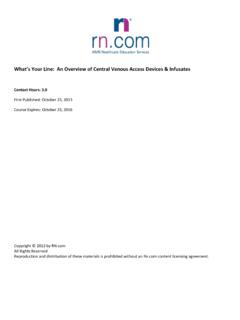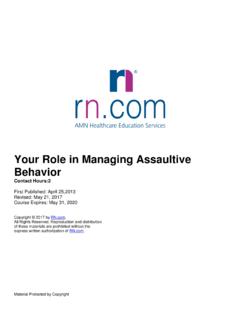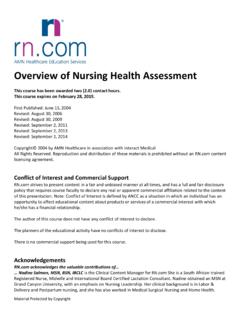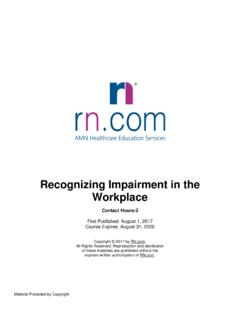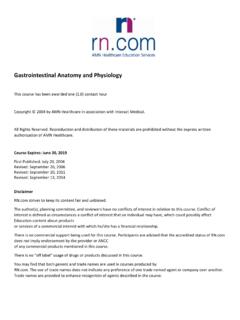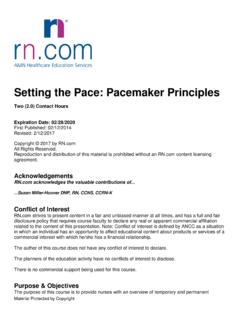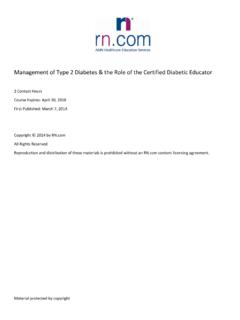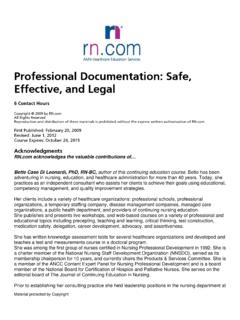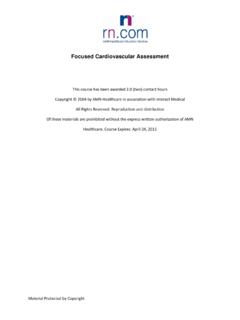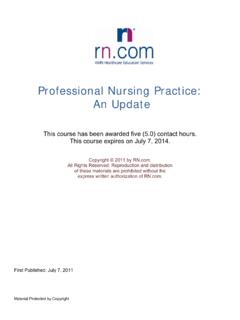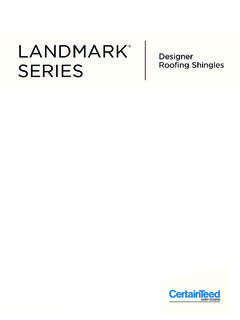Transcription of RN.com’s Assessment Series: Overview of Nursing Health ...
1 Material Protected by Copyright AMN - 2012 s Assessment series : Overview of Nursing Health Assessment This course has been awarded Two ( ) contact hours. This course expires on January 16, 2015. Copyright 2011 by All Rights Reserved. Reproduction and distribution of these materials are prohibited without the express written authorization of First Published: June 15, 2004 Revised: August 30, 2006 Revised: August 30, 2009 Revised: September 2, 2011 Revised: January 16, 2012 Material Protected by Copyright AMN - 2012 Acknowledgements acknowledges the valuable contributions.
2 Lori Constantine MSN, RN, C-FNP, a nurse of nine years with a broad range of clinical experience. Lori worked as a staff nurse, charge nurse and nurse preceptor on many different medical surgical units including vascular, neurology, neurosurgery, urology, gynecology, ENT, general medicine, geriatrics, oncology and blood and marrow transplantation. She received her Bachelor s in Nursing in 1994 and a Masters in Nursing in 1998, both from West Virginia University. Additionally, in 1998, she was certified as a Family Nurse Practitioner. She has worked in staff development as a Nurse Clinician and Education Specialist since 1999 at West Virginia University Hospitals, Morgantown, WV.
3 Nadine Salmon, RN, BSN. Nadine is the Education Support Specialist for and has a background in L&D & postpartum Nursing . She is also a Board Certified Lactation Consultant & has work experience in three countries. She is responsible for updating the course content to current standards.. Kim Maryniak, RNC-NIC, BN, MSN has over 22 years staff nurse and charge nurse experience with medical/surgical, psychiatry, pediatrics, and neonatal intensive care. She has been an educator, instructor, and Nursing director. Her instructor experience includes med/surg Nursing , physical Assessment , and research utilization.
4 Kim graduated with a Nursing diploma from Foothills Hospital School of Nursing in Calgary, Alberta in 1989. She achieved her Bachelor in Nursing through Athabasca University, Alberta in 2000, and her Master of Science in Nursing through University of Phoenix in 2005. Kim is certified in Neonatal Intensive Care Nursing and is currently pursuing her PhD in Nursing . She is active in the National Association of Neonatal Nurses and American Nurses Association. Kim s recent role in professional development includes Nursing peer review and advancement, teaching, and use of simulation. Disclaimer IMPORTANT INFORMATION strives to keeps its content fair and unbiased.
5 The author has no conflicts of interest to disclose. The planners of the educational activity have no conflicts of interest to disclose. (Conflict of Interest Definition: Circumstances create a conflict of interest when an individual has an opportunity to affect Education content about products or services of a commercial interest with which he/she has a financial relationship.) There is no commercial support being used for this course. Participants are advised that the accredited status of does not imply endorsement by the provider or ANCC of any products/therapeutics mentioned in this course.
6 The information in the course is for educational purposes only. There is no off label usage of drugs or products discussed in this course. Material Protected by Copyright AMN - 2012 Purpose & Objectives This course will provide the nurse with the knowledge needed to provide a complete Health Assessment for an adult patient. After successful completion of this course, you will be able to: 1. Ask appropriate questions when conducting a comprehensive Health history to elicit data that will be used to guide a physical examination. 2. List the components of the comprehensive physical examination and review of systems based on red flags identified in the patient history.
7 3. Determine when to perform four different types of Health assessments: Complete or comprehensive Interval or abbreviated Focused Special populations Introduction Health Assessment of patients falls under the purview of both physicians and nurses. While some nurses practice in extended roles (Advanced Nurse Practitioners), others maintain a more traditional role in the acute care setting. Assessment of patients varies based on both role and setting. A cardiac care nurse will be more familiar with and attuned to cardiac issues. A nurse on a neurologic unit will be more familiar with a more complex neurologic exam.
8 As you progress through this course, keep in mind that exposure to a detailed Health Assessment may lead you to a more comprehensive and thorough exam. For instance, if you note a patient has leukoplakia (coated tongue) as you perform your general Assessment , you may wonder about hygiene issues, underlying diseases, or medications that may cause this. Documenting the information, talking with the patient about it, and confirming it with the physician adds to your value as a healthcare team member, and ultimately a better patient care provider. As you progress through the course, note which parts of the exam are applicable in your practice, don t fit into your practice, or that you might want to include in your practice.
9 General Health Assessment The Nursing Health Assessment is an incredibly valuable tool nurses have in their arsenal of skills. A thorough and skilled Assessment allows you, the nurse, to obtain descriptions about your patient s symptoms, how the symptoms developed, and a process to discover any associated physical findings that will aid in the development of differential diagnoses. Assessment uses both subjective and objective data. Subjective Assessment factors are those that are reported by the patient. Objective Assessment data includes that which is observable and measurable (Jarvis, 2008). During the Assessment period, you are given an opportunity to develop a rapport with your patient and their family.
10 Remember the adage first impressions are lasting impressions? That adage is also very true in healthcare. You are often the first person your patient sees when admitted to your unit, returns from testing, or at the beginning of a new shift. Your interactions with your patient gives the patient and family lasting impressions about you, other nurses, the facility you are working in, and how care will be managed (Jarvis, 2008). All assessments should consider the patient s privacy and foster open, honest patient communications. Material Protected by Copyright AMN - 2012 Types of General Health Assessments In general, there are four fundamental types of assessments that nurses perform: A comprehensive or complete Health Assessment An interval or abbreviated Assessment A problem-focused Assessment An Assessment for special populations A comprehensive or complete Health Assessment usually begins with obtaining a thorough Health history and physical exam.
